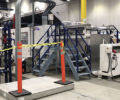Three questions with Jim Fish
Three questions with Jim Fish
<![CDATA[
James C. Fish Jr. was appointed president of Waste Management (WM) in August 2016 and added the role of CEO in November 2016. He previously served as the company’s chief financial officer and has been with WM since 2001.
In the article “Changing the model,” which will appear in the August 2017 issue of Recycling Today, Fish shares some of the Houston-based company’s recent moves to improve the profitability of its recycling business line.
The questions and answers below are outtakes from that interview regarding the company’s purchase of Deffenbaugh Recycling, Kansas City, Kansas, and Southern Waste Systems (SWS)/Sun Recycling in south Florida.
Recycling Today (RT): How have the acquisitions of Deffenbaugh Recycling and SWS/Sun Recycling affected WM? What were the immediate benefits of these purchases? What longer-term benefits do you expect to realize?
Jim Fish (JF): It actually has been two years ago since we acquired Deffenbaugh in Kansas City; it seems like a year. With Deffenbaugh, we acquired a big recycling plant there in Kansas City. We put all new equipment in that recycling plant, and we feel really good about it. We like our recycling business in Kansas City.
Southern Waste was already a zero-landfill business when we bought them. They are kind of shaped more like you would imagine the future would be shaped, which is moving away from landfills. Southern Waste did a lot of C&D (construction and demolition) material recycling.
Part of the reason we bought Southern Waste was that we could learn a lot from them on how to better recycle C&D materials. When you think about recycling for SWS, [purchasing the company] was more about learning how to better recycle C&D material and not traditional recyclables—we are good at that. We have a lot of experience with traditional recyclables through single-stream, but we don’t have nearly as much experience on C&D processing and recycling, and that was the primary goal behind buying SWS. They have traditional recycling as well that we incorporated into our existing facilities.
RT: Is it a goal of WM’s to get more involved in processing C&D debris in the future?
JF: To the extent that we continue to try and recycle, whether it is traditional recyclables or organic material or C&D material, I think that is part of our ultimate charter as a company to continue to further the recycling business.
We talked early on in this conversation about making sure that it makes sense economically, and I’ve said many times that recycling has to be both environmentally and economically sustainable. I would tell you that it is a goal of ours to continue to improve our recycling business and add to our recycling business. In fact, we recently added two recycling related businesses—smaller businesses—and we will continue to do that particularly where we have a shortage of recycling assets.
RT: Do you define that shortage of assets on a geographic basis or by processing capabilities?
JF: It is probably a little of both, but we do look at geography. With Deffenbaugh we had nothing in the Kansas City area, so clearly we had a shortage of recycling assets, whether you look at it per capita or geographically.
In South Florida, too, what we had a shortage of there was more by line of business and not so much within recycling overall. By waste streams or lines of business, we didn’t really have much in terms of C&D processing.
It depends on what assets we have in place and where we feel we have opportunity. I’ll give you an example: organics. When you think of organics, you don’t think of recycling so much. We look at where those systems might make economic sense, whether there is a real opportunity for us to increase down the coasts. And that tends to be how trends form in the U.S.; they form on the coasts and they move toward the center of the country. When we look at our own shortages by an asset standpoint, it can be by line of business or it can be per capita population.
]]>
Source: Recycling Today
Three questions with Jim Fish
<
